16 One day, as we were going to the place of prayer, we met a slave-girl who had a spirit of divination and brought her owners a great deal of money by fortune-telling. 17 While she followed Paul and us, she would cry out, “These men are slaves of the Most High God, who proclaim to you a way of salvation.” 18 She kept doing this for many days. But Paul, very much annoyed, turned and said to the spirit, “I order you in the name of Jesus Christ to come out of her.” And it came out that very hour.
19 But when her owners saw that their hope of making money was gone, they seized Paul and Silas and dragged them into the marketplace before the authorities. 20 When they had brought them before the magistrates, they said, “These men are disturbing our city; they are Jews 21 and are advocating customs that are not lawful for us as Romans to adopt or observe.” 22 The crowd joined in attacking them, and the magistrates had them stripped of their clothing and ordered them to be beaten with rods. 23 After they had given them a severe flogging, they threw them into prison and ordered the jailer to keep them securely. 24 Following these instructions, he put them in the innermost cell and fastened their feet in the stocks.
25 About midnight Paul and Silas were praying and singing hymns to God, and the prisoners were listening to them. 26 Suddenly there was an earthquake, so violent that the foundations of the prison were shaken; and immediately all the doors were opened and everyone’s chains were unfastened. 27 When the jailer woke up and saw the prison doors wide open, he drew his sword and was about to kill himself, since he supposed that the prisoners had escaped. 28 But Paul shouted in a loud voice, “Do not harm yourself, for we are all here.” 29 The jailer called for lights, and rushing in, he fell down trembling before Paul and Silas. 30 Then he brought them outside and said, “Sirs, what must I do to be saved?” 31 They answered, “Believe on the Lord Jesus, and you will be saved, you and your household.” 32 They spoke the word of the Lord to him and to all who were in his house. 33 At the same hour of the night he took them and washed their wounds; then he and his entire family were baptized without delay. 34 He brought them up into the house and set food before them; and he and his entire household rejoiced that he had become a believer in God.
**************
It is the Seventh Sunday of Easter—although one could choose to observe the Day of Ascension (the reading for Ascension is
Acts 1:1-11). The days of Jesus’ appearances is nearly complete. Pentecost is on the near horizon. The reading from Acts 1 for the Day of Ascension sets the foundation for what is to come. Jesus stands with the disciples, preparing to leave them. He gives them a commission, telling them that once the Spirit comes upon them, they are to take the gospel to the ends of the earth, beginning in Jerusalem, and then moving out from there through Judea and Samaria, and then from there to the ends of the earth. In prior readings, we have seen how the gospel has been moving outward from Jerusalem in the power of the Holy Spirit. We’ve seen the message taken to Samaria (Acts 8) and then to a Gentile community (Acts 11). We’ve witnessed the call of Paul (Acts 9) and then his crossing into Europe that results in the conversion of Lydia and her household in Philippi (Acts 16).
One thing you notice in reading the Book of Acts is that the way forward for the Gospel often requires those called to proclaim the Gospel to break through barriers. There is no easy pathway, and sometimes they have to be nudged along, so they can be in a position to proclaim the Gospel. If Paul is any indication, missionary work can be a bit complicated, filled with both setbacks and successes. In fact, Paul seems to get himself in trouble on a regular basis, and so it is with his visit to Philippi. In the reading from Acts 16 for this week, we pick up where we left off last week. Paul remains in Philippi, perhaps still residing at the home of Lydia. When the story picks up, Paul and Silas—and the rest of the mission team (note the use of the word we in verse 16)—are walking toward the place of prayer down by the riverside. As they make their way to the place of prayer, they are joined by another person. This person is a slave girl known for her prophetic powers. For some reason, she starts telling everyone that Paul and Silas are “slaves of the Most High.” This reference to them being slaves of God is important because the one doing the preaching is a slave. The assumption then is that if one proclaims a divine message, one must be a slave to that god/power. She is a slave, so they must be slaves as well. While she calls attention to them, apparently, it’s not the kind of attention that wanted. Since this happened several times over a period of days, we’re told that Paul was annoyed by her declarations. Paul stops and tells the spirit possessing her, the spirit that is proclaiming the message that they bring the word of salvation from the Most High, to leave. Such is what happens. The spirit that possessed her, the spirit that gave her the ability to reveal things about people, is now gone. That doesn’t make her owners happy. They have just lost their livelihood. This is a good example of the economic effects of religion. So, they are thrown into prison, without trial (something that is not allowed for citizens like Paul). This is the context in which we read the remainder of the story.
Note that Paul and Silas are imprisoned because they have infringed on the economic power of certain individuals. These people who are upset with Paul are concerned not about theology but about money. This woman, who was their slave, had earned them a lot of money. If she lost that power, she was of little or no worth to them. She was a commodity to her owners. Her message may have annoyed Paul, but she had revealed the truth, and that didn’t sit well with the rest of the community.
It is interesting that the charges laid against Paul and Silas is that they were Jews who were teaching things that weren’t appropriate for Romans. This represents in part the ongoing rejection and stigmatization of the Jews. In this case, the charge that they were Jews who taught things inappropriate for Romans may have been rooted in ignorance of Judaism. After all, there wasn’t a large enough community to start a synagogue. With the charges laid against them, the magistrates had them stripped, beaten, and thrown into the innermost jail cell (maximum security). Was it the religious component or the economic one? You be the judge.
So, we find Paul and Silas in jail. They are not only in jail, but they have shackles on them. You would have thought they were mass murderers, but such is not the case. It’s here, in prison, that we witness the power of hymn-singing. As Paul and Silas sit there in their cell, they begin to sing hymns to God, and Luke tells us that the other prisoners were listening. They were paying attention to the songs. As Paul and Silas sang, an earthquake hit, opening the cells and knocking off the shackles. Everyone in the jail was now free to flee, but they didn’t. They stayed put. More about that later in this reflection, so we can stay with hymn-singing.
This word about hymn-singing is enticing to me. That’s because singing hymns has always been a powerful element in my worship experiences. Whether new or old, as long as they are singable, they carry power. I don’t know what hymns Paul and Silas sang (I don’t think there were any Wesley or Brian Wren hymns in that hymnal), whatever they were singing had a powerful effect on their situation. Whatever they sang had a liberating effect. It seems to be the precursor to their freedom. Willie James Jennings connects worship, prayer, and singing to freedom and the concerns of those who have experienced torture and imprisonment.
Praying and singing join us to tortured and chained bodies, both past and present, and to the real pressure placed on disciples’ bodies as they look toward God. Praying and singing are acts of joining that weave our voices and words with the desperate of this world who cry out to God day and night. Each time we gather in the name of Jesus and lift our voices, this point of reference should shape our reverence and drive us to see and learn and know and change the situations of those who suffer especially in that holy name. Each time we pray and sing we are also joined to the shouts of joy and praise to a God who saves and delivers and invites us to take hold of divine power by faith. [Acts: Belief, p. 164].
In other words, worship should connect us to those around us who suffer. Paul and Silas’ experience of prison connected them to Jesus’ experiences as he approached death. They would be freed, but it was in the midst of suffering that they worshipped God and found liberation.
When the jailer made his way into the cells, he assumed that the prisoners would have escaped. That’s only natural. If you have the opportunity to be free, wouldn’t you take it? The implications for the jailer were much different. If his prisoners escaped, he would be held responsible. The better part of valor would be to take his own life. He was about to do so when Paul spoke up. Paul cried out to him, begging him not to harm himself, because everyone was still in the jail, including the other prisoners who had no reason to trust in the God of Paul, and yet they put themselves into Paul’s hands. All because of some hymn-singing.
Now, the jailer was over-joyed. Although he hadn’t heard the hymn-singing, he was drawn into this worship experience punctuated by an earthquake. That led to a sermon, as the jailer asked how he might be made whole (saved). With the question asked, Paul shared the gospel with him and his household, and the Philippian jailer responded positively. Paul baptized the jailer and his family, but notice that before the baptism takes place, the jailer tends to the wounds inflicted on Paul and Silas. These are the wounds inflicted by the magistrates, in response to Paul’s act of liberating a woman who had been turned into a lucrative economic tool. There was healing and liberation all around, and mixed in was a time of worship featuring hymn-singing. So, let us sing to God with boldness, and as we sing may we be woven into the healing work of God in the world.

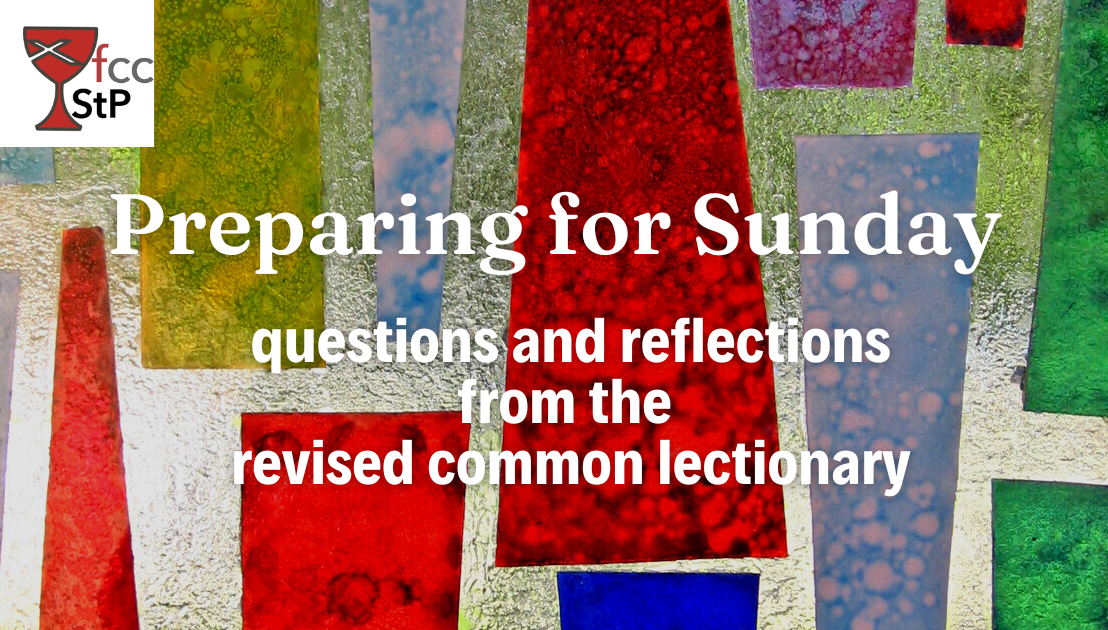
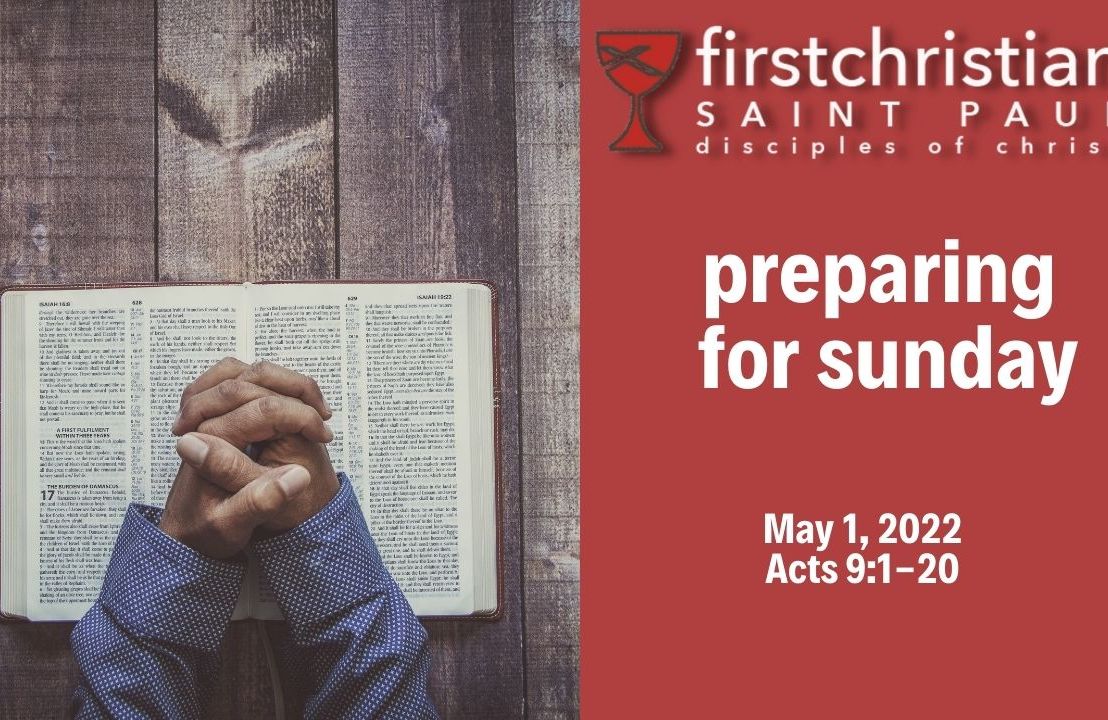



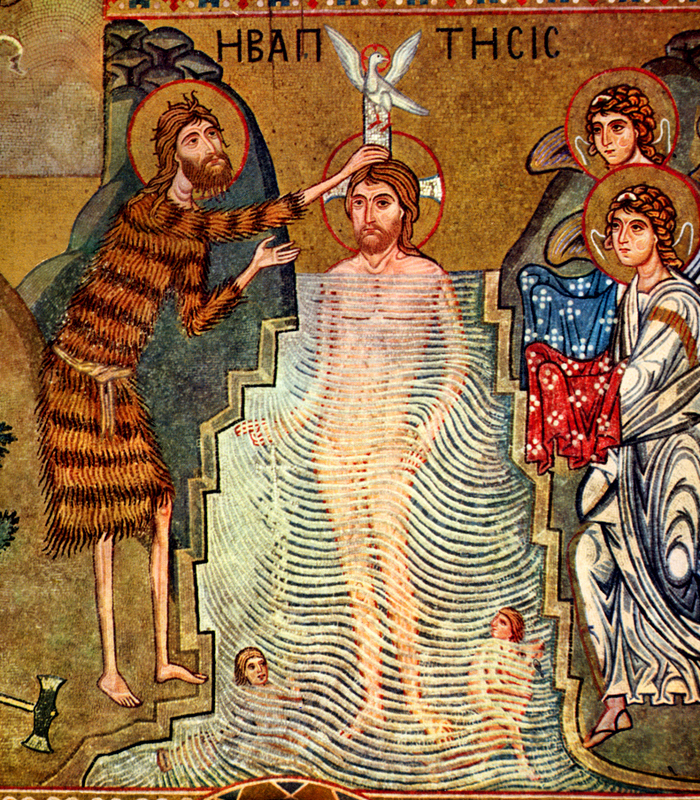
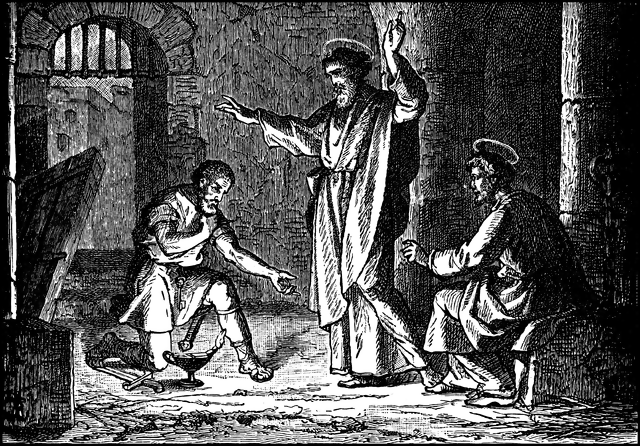

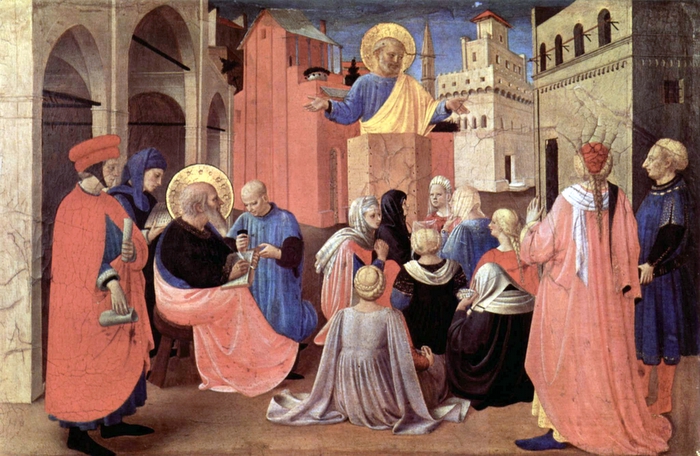
.jpg/1024px-Conversion_of_Saint_Paul_(Michelangelo_Buonarroti).jpg)
